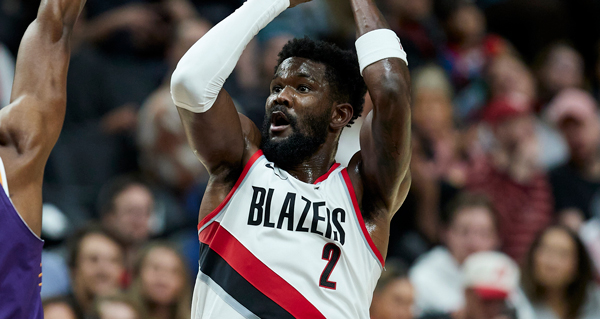The conventional thinking is that you can't coast into a job as an NBA point guard. There are too many very athletic dudes six-foot-five and under in the world, which makes fierce competition for spots at the most prolific prospect factory prep schools, the best AAU squads and college programs, the G-League and upper-tier European associations. Even if you've got Russell Westbrook's speed and strength, or Kyrie Irving's coordination, you have to work exceedingly hard to reach any of these developmental echelons, which are themselves ever-narrowing tributaries feeding into the NBA draft. And even being drafted guarantees nothing. Plenty of post-Lottery picks end up in China or Turkey, or as assistants at their alma mater.
With bigger guys, it's different. I'm thinking of notable flops like Darius Miles (6-foot-8), an inveterate knucklehead who was drafted out of high school. The league didn't give up on him until age 28. Tyrus Thomas (6-foot-9) lasted seven seasons and some change, despite having no real basketball skills to speak of. Stromile Swift (6-foot-10) was a smooth mover with an incredible name, and this sustained him for much longer than it probably should have. His NBA credit expired just before his 30th birthday.
And seven-footers, provided they are more agile than your average utility van, really have to screw up. This was truer a decade ago than it is now—Jason Collins, if he had been drafted this past June, wouldn't be looking forward to a 13-year career—but there is still a relatively low skill and investment threshold for big fellas, simply because there aren't many human beings of that size roaming the earth. Anybody as hulking and talented as, say, a young Fab Melo or an aging Willie Cauley-Stein at least gets a good long look from any team that could use a backup five, somebody to grab a few boards and knock Joel Embiid around. Isaiah Hartenstein is a valued member of the Knicks' rotation. The Isaiah Hartenstein of shooting guards averaged 14 points a night at Wisconsin or USC, bagged a communications degree, and called it a career.
I think of the inherent professional advantage that massive guys have whenever I watch Deandre Ayton. He's difficult to describe, if you're interested in being fair to him. He puts up numbers and, more than that, has plenty of games where he's genuinely useful on both ends of the floor, running to the rim and guarding it. We've seen him apply his talent in high-pressure situations. He had a great 2021 playoffs, excepting an uneven Finals performance. And yet, also: come on. Ayton is not significantly better at age 25 than he was at 20. He still doesn't like contact and doesn't get to the line. His passing is rudimentary. You need to feed him buckets; he won't create many on his own. There's a reason the Suns let him shop around in restricted free agency two summers ago, and a reason they matched the Pacers' four-year, $133 million offer sheet, and a reason they shipped Ayton to Portland a year later.
In fact, it seems a perfect summary of Ayton's value that the Suns deemed him slightly less potentially helpful than the combination of Bradley Beal and Jusuf Nurkić. They decided to roll the bones with a pretty good scoring guard and a passable center who are almost always hurt. (Nurkić, happily, has been very available this year. Beal is... about where you'd expect.) It seems a perfect encapsulation of Ayton's mindset that he was flatly thrilled to leave a borderline title contender to join a fallow rebuilding project, and that he has failed to expand into the vacuum your 2023-24 Portland Trail Blazers provide.
The Blazers don't need Ayton to fully realize his ability simply because nothing can save them this year. Prime Shaq would struggle to drag that squad to a play-in berth. But they are trying to figure out what they have in Ayton going forward, and are likely about as puzzled (18.6 points and 11.3 rebounds on 63.3 percent shooting over his last 12 games) and underwhelmed (basically everything before that) as the Suns were two or three years ago. Patrice O'Neal on Charlie Sheen fits here: He sucks, but he's good, but he sucks, at the same time. Prevarication is built into the evaluative process. It is perhaps the entire process. Anyway, 29 other teams are pleased not to currently be in the business of gauging what Deandre Ayton is, or could become.
It's unlikely, at this point, that he's ever going to truly ascend. That whole evolutionary David Robinson dream that bloomed on draft night is dead. Ayton's ceiling is somewhat fixed, due to work ethic, disposition, or the fact that his skills are more alluring than applicable. But his frame and easy movement ensures that he's going to be some franchise or another's headache for quite a while longer. If front offices won't be trying to solve whether he's a franchise-anchoring five, they'll be trying to peg what he should fetch in a trade, what he's worth in minutes and dollars. Because it's definitely not nothing, and you don't find guys like Ayton haunting many gyms. The question as to what you do when you find them remains thoroughly unresolved.



